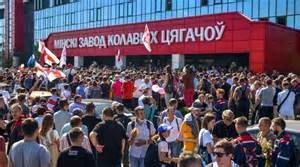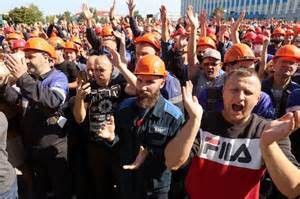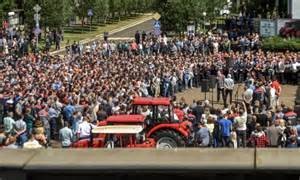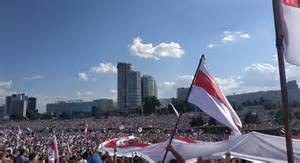BELARUS - The workers and the people will learn in their struggle the lessons of the Maidan!
- 30. Aug. 2020
- 10 Min. Lesezeit
Aktualisiert: 9. Sept. 2020
In the following we want to share a very important article on the recent developments and struggles in Belarus from the antifascist and revolutionary newspaper "Antifascist Action" from Austria. In our opinion the article is analyzing the situation and interests of the Belarusian working class and people very good and shows in a differentiated way the interests and interventions of the imperialist forces of EU, USA and Russia. We recommend it to everybody who want to get a clear picture about the situation in the eyes of the standpoint of the proletariat and masses.
Belarus: The workers and the people will learn in their struggle the lessons of the Maidan!
Since a short time Belarus has been moving increasingly into the focus of the international bourgeois press, which is eagerly raising the mood for the “opposition movement”. A large part of the alleged “left”, who often call themselves “revolutionary”, “socialist” or “anti-fascist”, is going a very similar way. A merging of capital and the liberal left also on the question of the protests in Belarus? At the same time the “opposition movement” can by no means be viewed as a unified movement, because on the one hand various imperialist groups are fighting for leadership in it, on the other hand there is also a struggle of the workers and the rural parts of the population who are trying to take their own way. The current protests found their immediate trigger in the extremely violent repression against various smaller manifestations and demonstrations, who were directed against the apparent electoral fraud by the Lukashenko government. It is very likely that government defrauded in this election, though not to the extent that some spokesmen in the current opposition movement have claimed. In recent years the opposition movement in Belarus has been massively fragmented, divided and relatively isolated. There are various reasons for this: what is particularly important is that the social and economic situation and supply of the population is relatively good compared to other countries from the former Soviet Union (or in its sphere of influence). If you look at Ukraine, Romania or large parts of Slovakia, the picture there is completely different. In fact, Belarus is the only country in the successor states of the Soviet Union that not only did not reduce the industrialization of the country, but even expanded it. The state sector is very high, a series of protective tariffs and other measures represented strong regulatory interventions in relation to the market and in many cases prevented a “neoliberal” program. This and many other aspects have brought the fact, that the opposition to the ruling regime has had a difficult time in recent decades. But, despite all these points, Bealrus is of course a society in which the ruling classes exploit the working class and the people and allow foreign companies to interfere more and more, allowing ever larger sections of the Belarusian masses to work for foreign profit interests. Therefore, the share of the economy that is in the hands of foreign corporations has grown massively in recent years. Capitalists from the European Union and Russia are the leaders in that development. In this process the Lukashenko regime has carried out many "reforms" in recent years, which have led to great dissatisfaction among the masses, as they have taken back, reduced or at least significantly weakened social achievements and economic security. As a result, the formerly very weak opposition has gained more support in recent years and opportunities to organize itself better.
Especially the “western” imperialists such as Germany and Great Britain support massively leading forces of the opposition movement and their bourgeois press spreads the image that it is also about the Belarusian masses defending themselves “against Russian influence”, since Belarus is supposedly totally “ruled by Russia”. This is simply a lie that fuels a Russophobic mood. Likewise, the anti-Russian sentiment, which is against the peoples, should be heated up by saying that Belarus is a “Russified country”, which is intended to divide the cultural and historical closeness of the Belarusian and Russian peoples in certain aspects and, above all, to spread national hatred. When the capitalist ruling classes of the Soviet Union (who were only in words socialist) began to privatize and liberalize, the economic- and party functionaries in Belarus feared that they would have to surrender their position of power completely to Russia, because it would have been the Russian-Soviet capitalists that would have benefited from privatization and liberalization in Belarus. Therefore they tried everything to maintain their bureaucratic-capitalist position of power and to limit the direct access of Russian capital through strong state intervention. But that only worked for a few years, because the foreign trade was still strongly tied to Russia, which is why certain concessions had to be made. From the privatization and liberalization of the Belarusian economy in the last years, not only Russian capitalists benefited, but also capitalists from the EU got stronger and stronger. Not least, Austrian capital was able to benefit from this: the Austrian consul general in Belarus, Sergej Kostyuchenko, is also head of Priorbank, one of the three most important banks in the country. The Priorbank, in turn, is owned by the Austrian Raiffeisenbank. The Lukashenko government tried to manoeuvre between the various imperialists and to keep the influence of one group of foreign capitalists under control by tolerating the activities of other groups of foreign capitalists and thus to secure its own position. The result, however, was that all imperialists had a growing interest in a change of government, because they want to enter even further and faster into Belarus, which is why they built up and strengthened opposition forces loyal to them. Hence, the current opposition movement is not only made up of “pro-Western” organizations, even if they are currently leading the movement, but Russian influence in the opposition movement is also considerable. For example, Viktor Babariko was Lukashenko's strongest opponent in Belarus in recent years, he was arrested and is still in detention. He carried out his opposition activities, while at the same time he was head of Belgasprombank, one of the most important banks in Belarus owned by Russian Gazprom. Lukashenko called him the “Kremlin puppet” and legitimized the prison sentence by saying that Babariko would only represent the “interests of a foreign power”. The also very important opposition figure Valery Tsepkalo went to exile in Russia when the pressure in Belarus became too big. The fact that the forces supported by the West are currently leading the opposition movement is not least due to the fact that “Western” imperialism is trying to seize the opportunity, when those opposition forces that are close to Russian imperialism are relatively weakened. The “coordination council” of the “opposition movement”, founded a few days ago, gathers all possible and sometimes very contradicting forces (whose common ground is above all radical anti-communism). This shows very well that the opposition movement promoted by the western imperialists is currently trying everything to become more powerful and consolidate its leadership, but also that it has to go very quickly, because it has so far lacked unity and stability. Therefore, the long-term leadership of the “pro-Western” opposition should not be overestimated. This is also the reason why the weakest sections of the “pro-Western” opposition are already now increasingly demanding a “dialogue”, by which they admit that they have to be content with partial goals for the moment, but above all trying to rearrange their forces in order to prepare for the next stroke.
The current relative hegemony of the “pro-Western” candidates in the leadership of the opposition movement is on weak feet, but is of course persistently pursuing specific goals. According to their official documents and statements from the recent period before the protests, these include measures such as: liberalization of the flow of capital, deregulation of the labor market, tax cuts, guarantees for private property, introduction of "EU standards" for the movement of goods and general trade, measures for development and strengthening a free market, etc. Since the opposition leadership pursues such an anti-peoples program, the longer the movement lasts, the more it comes into conflict with the masses it leads, who are not interested in such measures, and above all joined the opposition because of general dissatisfaction and weariness with the political situation. It does not help the leading opposition forces that they are currently not presenting their demands so far publicly. They know very well that they would massively lose influence. In addition, the opposition leadership, sponsored by several EU and US imperialists, is under additional pressure as it has to try to maintain its hegemony and not to lose it again to the forces connected to Russian imperialism.
Since the "pro-Western" opposition leadership has to move quickly, the imperialists help them at all levels: on the one hand diplomatic and political, where large parts of the EU are increasing the pressure on the Belarusian government and have already decided on political and economical sanctions. These sanctions will primarily be at the expense of the Belarusian people, whoever supports them can only be an enemy of the Belarusian masses! It is a cynical calculation of the EU imperialists in which the people are to be plunged even more into ruin through sanctions, in order to then use the growing dissatisfaction and implement the imperialist goals of the EU (the same methods are known from Ukraine, Syria, Venezuela , …). At the same time, military mobilization and intervention are taking place, especially with those forces that have served the EU and the USA so well in the Ukraine in recent years: fascists and mercenary gangs who do not shy away from any crime! The 61st Hunters Infantry Battalion of the Ukrainian Armed Forces, a kind of "Foreign Legion" of Ukraine, infamous for its bloody crimes and with a share of 25% foreign mercenaries, was relocated to the northern Ukrainian border in the Zhitomir region, which shares a 280km long border with Belarus. At the same time, according to tenders in military magazines, the 61st Battalion is actively looking for people "with Belarusian/Russian language and culture skills". Dimitry Yarosch, the leader of the “Right Sector”, a well-known paramilitary fascist party in Ukraine, which played a leading role in the Maidan movement, said in an article he wrote on the occasion of the opposition movement in Belarus that he has “been training Belarusians since many years” and that Belarusians, under the leadership of the Right Sector, “formed their own unit in the struggles to recapture the Donbass”. He proudly proclaims: “I held dozens of training exercises with Belarusians, traveled all over the country, gave instructions for patriotic Belarusian actions against Lukashenko. (...) Many of those I trained, are now taking part in the uprising in Minsk”. Of course, Igor Mosiychuk should not be missing in this nice gathering. He is the former vice-commander of the so-called Azov-Battalion, a former paramilitary organization (today part of the Ukrainian armed forces) which not least used Hakenkreuz-flags as symbols for troop photos and which received active support from international Nazis. He reported that organized groups of former Azov soldiers had already crossed the Belarusian border "in different ways" and were "an active part of the anti-government protests in Minsk". At the same time, NATO units pulled together a smaller number of troop contingents at Poland's western border to Belarus. It is unlikely that the imperialists of the EU and the US envisage an open war in Belarus, but if they cannot celebrate a quick political success in the near future they will, through ongoing unrest and interventions with mercenaries and paramilitary groups, try to plunge the country into chaos, provoke a latent civil war and let Belarus bleed to death in order to take it over afterwards.
The white-red-white flag propagated by the leadership of the opposition movement in Belarus, which historically is above all an anti-Soviet symbol and was also officially used by the collaboration forces during the Nazi occupation, also fits in with this. The situation is similar with the coat of arms of the “White Knight”, which historically was also used as a symbol of the Belarusian Nazi forces. Many of the masses wear these symbols in the current protests without attaching particular importance to their historical use. But the leadership of the so-called "opposition movement", did not coincidentally chose these symbols.

While the "pro-western" opposition leadership is mainly supported by the urban petty bourgeoisie in terms of social composition, the workers, as well as the rural population participate to a certain extent in the protests and struggles against Lukashenko's government. But they are in a very complicated situation. The leadership of the opposition movement is in the hands of the fascist chain dogs of the German, British and also US-American imperialists. The currently weaker part of the leadership of the opposition movement is in turn firmly connected with Russian imperialism, which in recent years has also pushed for “reforms” which are against the people and sometimes took tough economic measures against Belarus, if not enough far-reaching concessions were made there. Supporting Lukashenko's government is not an alternative for the masses either, because after all it was this clique that carried out the deteriorations of the last few years and allowed the various imperialist interest groups to come into the country in the first place.

At the same time, however, the independent political organizations of the Belarusian working class are in many cases still inexperienced with large organized struggles, especially in a situation like the present one. The fact that the workers are increasingly appearing as a separate factor in the protest movement and the democratic struggles is scaring the ruling classes, and the regime’s prosecutors and judges have repeatedly imposed heavy punishments on leaders of independent strikes in the last few days, including imprisonment. The struggle of the Belarusian workers is developing, although not to the extent that many “liberal left” in the West are propagating. They use the activities and struggles of the workers in Belarus as a pretext to support the opposition led by imperialism. In doing so, they primarily harm the Belarusian worker’s movement, which is currently differentiating itself more and more from the hegemony of the leading organizations of the “opposition movement” and the “Coordination Council”. In this situation, the class-conscious organizations and initiatives in Belarus need solidarity that will help them to continue on their own independent path, both against the “opposition puppets” of imperialism, which are supported by fascist mercenaries from Ukraine, and against the Lukashenko clique. The struggle takes place on many different fronts, is complicated and it is certain that the struggle conditions for the Belarusian worker’s movement would get worse, if the "opposition" with its current leadership maintains hegemony and asserts itself. Nevertheless, it must also struggle against the Lukashenko government, which has increasingly betrayed and sold the interests of the workers and the entire nation in the recent years.
Therefore, the Belarusian worker’s movement not only wages a struggle against the deterioration and attacks by Lukashenko's government, and also not only against the puppets of the “West” in their disguise of an “opposition”, but also for the national liberation of Belarus from any imperialist interference and exploitation . What the worker’s movement in Belarus urgently needs, is its own class-conscious leadership in the form of a revolutionary party and the conscious preparation for a appropriate defense against military mercenary interventions, that western imperialists will try to impose on the country under certain conditions. The situation in which their Ukrainian class-comrades have found themselves since the fascist Maidan coup will be an important lesson to them. And neither the imperialists nor Lukashenko should underestimate, what it means for the most advanced sections of the Belarusian worker’s and people's movement to build on these lessons in their struggle.
(P.G.)
















Kommentare